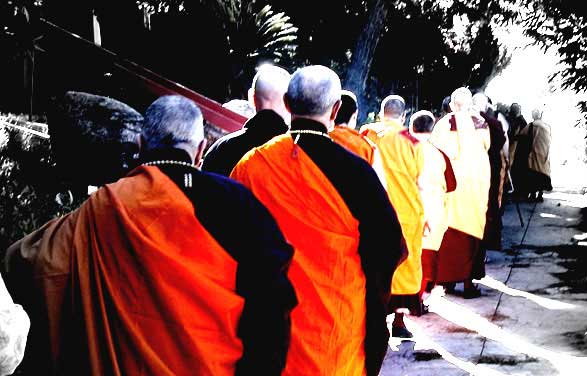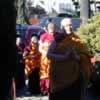|
The I.B.M.C. Grand Ordination was held on December 11, 2004 in the Korea town section of Los Angeles California. The Bhikkhuni (Pali) lineage died out in Theravada countries almost a thousand years ago, centuries before Buddhism entered Tibet and the reason for the Bhikkhuni order not being established there. Even today it's quite difficult for women following Theravada or Vajrayana (Tibetan) Buddhism to become fully ordained. Women need to be ordained by at least ten Bhikkhunis and accepted by the Bhikkhu Sangha. The Bhikkhuni order never ended in China, Korea or Vietnam, making it much easier for women in those traditions to become fully ordained. Ven. Karuna Dharma the abbess of the I.B.M.C. was one of the first American born women ordained as a Bhiksuni in the Vietnamese Zen tradition in America. In 1976, nuns from Fo Kwan Shan in Taiwan stopped in Los Angeles, hoping to establish a temple for their devotees. Ven. Dr. Thich Thien-An expressed a desire to ordain a Bhiksuni (Sanskrit) and asked their permission. They readily agreed allowing Ven. Dr. Thien-An to ordain Ven. Karuna Dharma in August of 1976. Over the years Bhiksunis have settled in Los Angeles from Taiwan, Hong Kong, Korea and Vietnam. When Ven. Karuna decided to sponsor a Grand Ordination in 1994, there were enough Bhikkhunis. Dr. Thien-An originally wanted a Multi-Yana ordination for his monks and nuns because Americans live in such a diverse society. When Ven. Karuna Dharma was ordained as a novice (s‚ramanerika), Ven. Thich Thien-An, Ven. Hsuan Hua from Gold Mountain Monstery in San Francisco, and a Japanese Archbishop were her ordaining masters. This tradition have been carried on under Ven. Karuna Dharma. The 2004 ordination had ordaining masters from the three Buddhist traditions: Theravada, Mahayana and Vajrayana. They represented Sri Lanka, Thailand, China, Korea, Vietnam, Tibet and Japan, as well as America. Twenty Tibetan nuns flew in from around the world to take the two week training and Ordination. They came from Spain, Germany, Switzerland, Austria, British Columbia, Nova Scotia, and the U.S. They were joined by three Vietnamese nuns, and an American born Korean nun. It was wonderful to see nuns who ranged from 33 to 68 years of age and different backgrounds come together, form a sangha, and work together with no acrimony. For two weeks 20 nuns, six Zen priests, two novice Zen priests, one s‚ramanerika, one Anagarika, and four Atthanga s,ilas trained together at the I.B.M.C. The vice abbot of I.B.M.C. taught in the mornings, and Ven. Karuna taught Vinaya in the afternoon. Rev. Vajra an I.B.M.C. Zen Dharma teacher taught Buddhist history and its application to the modern age in the evening. It was a busy schedule. The early morning hours were put aside for meditation and chanting, including the the 108 Bows Ceremony. There were also discussions on how to start and live in community. The new sangha split into six work groups: three cooked the breakfasts, three cooked lunch and three cooked the evening meal, with a cleaning crew for each meal. There was also samu... Cleaning the grounds and buildings every day, with some time put aside for rest and socialization. The ceremony was led by Thuong Toa, Ven. Thich Man-Giac, and Su-Ba Thich-nu An-Tu (Ven. Dr. Karuna Dharma) as Ordination Masters. The Deputy Ordination Masters were, Ven. Ahangama Dhammarama, Su-Ba Thich-nu Dieu-Tu. The Vinaya Acaharyas were, Ven. Bogalle Sumana, and Ven. Il Ah Sunim. These six Masters were Vietnamese, Sri Lankan, Korean and American. The fourteen Official Witnesses were Tibetan, Vietnamese, Korean, Sri Lankan, and Thai: Ven. Drupon Tinley Nagpo, Ven. Thich-nu Nhu Ngoc, Ven. Sumana Barua, Ven. Thich-nu Tien Lien, Ven. Thich An-Hue, Ven. Lakkhana, Ven. Miao Hsi, Ven. Havanpola Shanti, Ven. Thch Nu Hoa Dao, Ven. Palewala Rahula, and Ven. Egyoku Roshi from Zen Center of Los Angeles. The ceremony began with the Masters crossing from Thien-An House to the Zendo, where a private ceremony was held. They were led by the I.B.M.C. resident Paula blowing a conch shell and holding the Buddhist flag. Once the masters were seated, the ordainees processed from Ananda Hall, led by Zen Dharma Teacher Rev. Vajra Karuna. Once inside the Zendo they formally invited the masters to perform the ordination ceremony and underwent questioning by the Vinaya masters making sure they were appropriate candidates and had the requisies for Ordination. As the masters and Ordainees processed out of the Zendo to Ananda Hall, laypeople showered rose petals upon them, and 100 white doves were released. The actual ordination took place as a public ceremony in Ananda Hall. The Bhiksunis repeated their vows in Pali and were handed robes and kesas (rakasus for the 8 vow novices). The Bhiksunis received ground cloths and alms bowls, water strainers, razors, needles and thread. The ceremony lasted 2 1/2 hours, and ended with the Theravada monks chanting blessings in Pali as everyone held a sacred white thread. In addition, a gold cord went from the Buddha to Ven. Karuna and the two female Ordaining masters to all the bhiksunis, symbolizing the Bhiksuni lineage. That
night nine Bhikshunis and two Dharma teacher burned incense into
their scalps, during a ceremony accepting the Bodhisattva Precepts,
symbolizing their vow to be reborn again and again and not enter
Nirvana until all beings achieve liberation.
|























